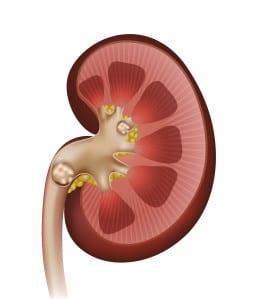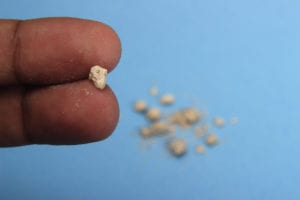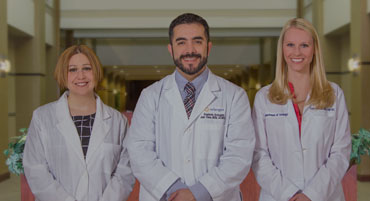Kidney Stones in Chattanooga, TN
At UT Urology in Chattanooga, TN our expert urologists specialize in the diagnosis and treatment of kidney stones in both men and women. Do you fear you may have kidney stones? Contact us today to schedule your appointment with one of our urologists.
Click to Call UT Urology Today
WHAT ARE KIDNEY STONES?
 A kidney stone is a solid formation of tiny mineral crystals that can develop in the kidneys or anywhere in the urinary tract. The kidneys filter the blood and remove waste products from the body through urine. When high levels of these minerals become concentrated they can create a stone.
A kidney stone is a solid formation of tiny mineral crystals that can develop in the kidneys or anywhere in the urinary tract. The kidneys filter the blood and remove waste products from the body through urine. When high levels of these minerals become concentrated they can create a stone.
Everyone forms crystals in their urine, but not everyone goes on to form kidney stones. When these crystals remain small, they can be excreted without pain, if the urine is diluted enough. Stones can also form in the ureter or bladder. Stones formed in the kidney that do not block the flow of urine usually do not cause symptoms. But if they migrate into the ureters, they may cause pain and blood in the urine. Kidney stones increase the risk of chronic kidney disease.
WHAT CAUSES KIDNEY STONES?
Kidney stones are more common in men than women. Pregnant women can develop kidney stones. Most people develop kidney stones between the ages of 20-49. However, children as young as 5 can develop kidney stones. Risk factors include:
- Dehydration. Low fluid intake or strenuous exercise without adequate fluid intake, results in an excess concentration of these minerals in the urine and form crystals.
- Certain medical conditions and prescription drugs. Diet, genetics, and climate also influence kidney stone formation. In children, diet is the main cause.
- Intake of salty foods. Low fluid intake, sodas and other foods sweetened with high fructose corn syrup put children at risk for kidney stones.
FOUR MAIN TYPES OF KIDNEY STONES
- Calcium Stones – The majority of kidney stones occur in two main forms: calcium oxalate and calcium phosphate. Oxalate stones are most common and are due to an accumulation of calcium oxalate in the urine. Phosphate stones are less common and are due to autoimmune diseases and certain drugs.
- Uric Acid Stones – Uric acid stones can form in acidic urine. Uric acid is a byproduct of the breakdown of animal proteins, making the urine more acidic. Gout, chemotherapy and other disorders increase the risk for this type.
- Struvite Stones – These stones are made of magnesium ammonium phosphate and/or calcium carbonate and are known as infection stones. They result from chronic and recurrent urinary tract infections due to a specific type of bacteria.
- Staghorn Stones – These are stones of any type that grow large and branched, and occupy a large portion of the urinary system. Often they are a mix of struvite stones and calcium carbonate stones. They usually contain bacteria and can destroy the kidney if untreated or cause life-threatening blood infection or sepsis.
- Cysteine Stones – These stones are due to an inherited disease called cystinuria.
Learn How To Reduce Your Risk Of Kidney Stones
WHAT ARE SYMPTOMS OF KIDNEY STONES?
A kidney stone may not show any symptoms until it moves around within your kidney or passes into your ureter (the tube connecting your kidney and bladder). These are common symptoms of a kidney stone:
- Severe pain in the side and back below the ribs
- Pain that radiates to the lower abdomen and groin
- Pain that comes in waves
- Pain when urinating
- Pink, red, or brown urine
- Cloudy or foul-smelling urine
- Nausea and vomiting
- Persistent need to urinate
- Urinating more often than usual
- Urinating small amounts
The inability to urinate or frequent and urgent urination can be due to the stone passing from the ureters into the bladder. Another danger is when the kidney is blocked by a stone, causing back up of urine in the blood, posing potential damage to kidney tissues and infection.
Most kidney stones will pass on their own with some pain medication and drinking lots of water. In other instances, the stone may become lodged or severely painful and will need surgery.
WHAT ARE THE SIGNS OF A KIDNEY STONE EMERGENCY?
Most of the above symptoms can become more severe. The question is: when is my kidney stone an emergency needing immediate attention? Call the team at UT Urology if the pain is becoming severe, or if you experience any of these symptoms:
- Pain accompanied by nausea and vomiting
- Pain so severe that you cannot find a comfortable position
- Pain accompanied by fever and chills (sign of an infection)
- Blood in your urine
- Difficulty urinating
Click to Call UT Urology Today
HOW ARE KIDNEY STONES DIAGNOSED?

WHAT IS COMPLEX STONE DISEASE/KIDNEY STONE DISEASE?
When a person develops a kidney stone, they are said to have kidney stone disease, clinically known as urolithiasis. This means a solid piece of material has formed somewhere in the urinary tract. Most people who develop kidney stones have a mix of genetic and environmental influences. Stones form in the kidney when minerals in urine are at high concentrations. About 50 percent of the people who develop a kidney stone will develop another stone within 10 years.
Learn How To Prevent Recurring Kidney Stones
HOW ARE KIDNEY STONES TREATED?
Most often, small kidney stones will pass out of your body through the urinary tract within 48 hours, with increased fluid intake and without treatment. Pain medications may be needed. To help stones pass on their own, medications such as tamsulosin (Flomax) may be prescribed to increase passage.
MEDICAL KIDNEY STONES TREATMENT
Because kidney stone disease is linked to systemic conditions, your urologist will perform a detailed medical and dietary history, and conduct urinalysis, blood tests, metabolic studies, and imaging studies. Your urologist most commonly will recommend increased fluid intake, as dehydration is a key risk factor for stone formation. Because stones are linked to diet, your urologist will counsel you on dietary changes. Your urologist may also offer certain medications like diuretics. For Uric Acid stones, you will be advised to modify your diet to limit your intake of non-dairy animal protein and may receive drugs to decrease your levels of uric acid. For uric acid and cysteine stones, you will be advised to modify your sodium and protein intake. You may be offered potassium citrate to increase the pH of urine.
WHAT MEDICATIONS ARE AVAILABLE TO MANAGE MY SYMPTOMS?
Once we analyze the types of stone or stones you are forming, we can prescribe certain medications to help you prevent future stones. Calcium Stones — For these, we may prescribe a thiazide diuretic or phosphate-containing preparation. Uric Acid Stones — Here, the need is to keep your urine more alkaline. Allopurinol can reduce uric acid levels, and may even dissolve uric acid stones. Struvite Stones — This may involve long-term use of low doses of antibiotics. Cystine Stones — Medications may decrease the amount of cystine in your urine, but these are the most difficult to treat this way.
SURGICAL KIDNEY STONES TREATMENT OPTIONS
All surgical kidney stone treatment options are performed while you are asleep.
SHOCK WAVE LITHOTRIPSY SHOCK
Wave Lithotripsy is the use of high-energy sound waves to pulverize the stones which can then be more easily passed. This is the most common kidney stone treatment option. It is best for stones smaller than 2 cm and stones that are not overly dense. Lithotripsy is non-invasive and is performed on an outpatient basis, but requires some sedation to reduce discomfort. Additionally, this procedure may allow you to have kidney stones treatment without a ureteral stent which may cause some minor discomfort and urinary symptoms. In some situations, you may require more than one lithotripsy to completely treat your stones. This procedure is not recommended for pregnant women, people with bleeding disorders, infections, skeletal abnormalities or the morbidly obese.
URETEROSCOPY WITH LASER LITHOTRIPSY
Ureteroscopy with Laser Lithotripsy is an endoscopic kidney stones treatment option to treat stones located anywhere in the urinary tract. Stones up to 2 cm in diameter may be treated effectively. These stones can be treated with the use of a flexible ureteroscopy or rigid ureteroscope depending on stone position. With this procedure, a small miniature fiberoptic camera (ureteroscope) is inserted in the urethra and up into the kidney. A Holmium laser is used to break the stones into small fragments. These fragments are extracted by the ureteroscope with a small basket. It is an outpatient procedure under general or spinal anesthesia. Because the ureter swells during the surgery, a small stent (hollow tube) may be placed in the kidney to facilitate urine flow postoperatively. The stent is removed at home if strings are left on the stent or subsequently at a follow-up visit. This treatment option also offers the highest success rate to have your stone removed with one procedure.
PERCUTANEOUS NEPHROLITHOTRIPSY
Percutaneous nephrolithotripsy is an endoscopic means of removing large stones. This kidney stone treatment requires a small, less than 2 cm, incision in the back. The stones are broken up with ultrasound or laser treatment. A hollow tube is inserted. The crushed stone is removed through this tube. This procedure is used for large and irregularly shaped stones (usually larger than 1.5cm – about the size of a marble), for people with infections, for people who are not candidates for ureteroscopy, and for those whose stones cannot be broken up by extracorporeal shock wave lithotripsy. This kidney stones treatment option requires general anesthesia, and highly specialized surgeons, like those at the UT Urology.
ROBOTIC SURGERY USING THE DA VINCI® ROBOTIC SURGICAL SYSTEM
Robotic Surgery using the da Vinci® Robotic Surgical System is minimally invasive, and offers less pain, blood loss, scarring, and faster recovery. It is a specialized form of minimally invasive surgery using a robotic arm, a camera, a 3D imaging processor, and remote control. It is very precise, and ideal for delicate urologic surgery. Stones removed by the robot are usually performed in conjunction with another robotic procedure.
OPEN SURGERY
Open surgery is rare but may be needed if other methods fail. Surgery may be required where the stones are damaging kidney tissue, causing recurring urinary tract infections, blocking the flow of urine or are significantly large.
WHICH METHOD OF KIDNEY STONES TREATMENT SURGERY SHOULD I CHOOSE?
Your urologist at UT Urology will discuss your options for removing your kidney stone if attempts to pass the stone with pain medication and increased fluid intake are unsuccessful. We will discuss your surgical options: shock wave lithotripsy, ureteroscopy with laser lithotripsy, percutaneous nephrolithotripsy, robotic surgery, or open surgery (used only if other options fail). Certain options may suit your type of stone better. Size may dictate one option over another. This will all be a part of the discussion on how to proceed.
CAN KIDNEY STONES BE PREVENTED?
It is most beneficial to increase your water intake and make changes in your diet. Drinking lemon juice may be helpful. Studies suggest that a healthy intake of dairy products reduces kidney stone formation, but the use of calcium supplements may increase the risk. A normal calcium diet is suggested. High salt and high sugar diets may be bad for kidney stones. Obesity is related to kidney stones. Sometimes medicines can be used to decrease the risk of developing new stones. If a stone has passed and can be analyzed in a lab, the lab can determine the type of stone so that specific prevention methods can be used.
WHY CHOOSE UT UROLOGY?
At UT Urology, we have four doctors who specialize in various aspects of kidney stone development and surgical removal. This expertise not only comes into play when removing a current stone but also in the prevention of future stones.
The providers at UT Urology are widely respected among the U.S. urology community and are regional leaders in providing state-of-the-art diagnosis and treatment of all genito-urinary conditions. We have been chosen to be a teaching/research site for the development and assessment of new endoscopic stone management technologies. We hope that through this research we will find better ways to minimize pain and recovery from stone disease while maximizing success and patient satisfaction. We are top-rated kidney stone specialists in Chattanooga, Tennessee, and Alabama area. Contact us with your concerns. We will listen, answer your questions, explain your condition and provide stellar services to address your specific needs.
CONTACT US
The highly specialized urologists at UT Urology are widely respected among the U.S. urology community and regional leaders in providing state of the art diagnosis and treatment of prostate and urinary tract diseases. We are top rated urologists in the Chattanooga, Tennessee, Alabama and Northern Georgia area. We will listen, answer your questions, explain your condition and provide stellar services to address your specific needs.
Contact Us Today! We treat patients suffering from kidney stones in Chattanooga, East Ridge and the greater Chattanooga area, and Winchester. If you are interested in scheduling an appointment, please call our office or fill out our contact form to schedule a consultation.
PROVIDERS


